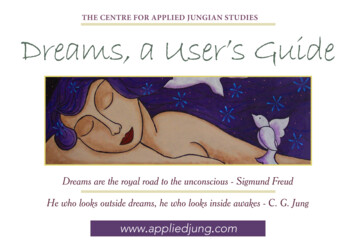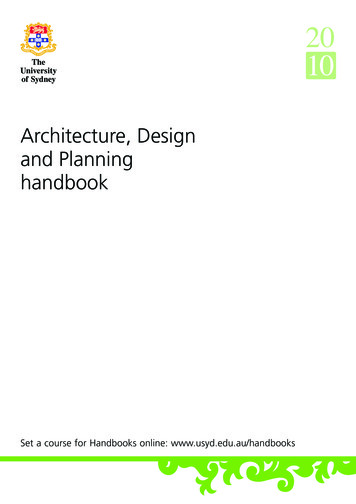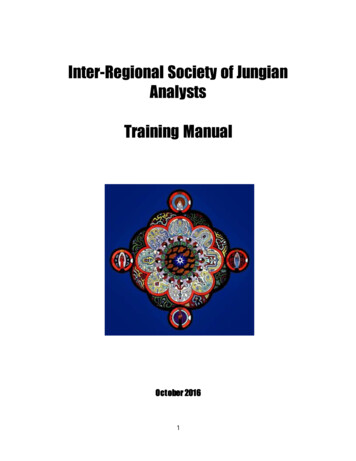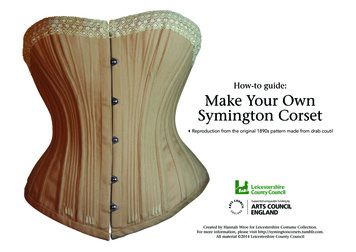
Transcription
THE CENTRE FOR APPLIED JUNGIAN STUDIESDreams, a User’s GuideDreams are the royal road to the unconscious - Sigmund FreudHe who looks outside dreams, he who looks inside awakes - C. G. Jungwww.appliedjung.com
www.appliedjung.comTHE CENTRE FOR APPLIED JUNGIAN STUDIESUnderstanding your dreamsTA B L E O F C O N T E N T SIntroduction to dream interpretation2Illumination (the first step)7How to capture a dream7Amplification (associations)8Amplifying the dream9Education (understanding the dream message)10Understanding the dream11Some sample dreams12Transformation14The real work14An example of dream interpretation fromSigmund Freud15 The Centre for Applied Jungian Studiespage 1
www.appliedjung.comTHE CENTRE FOR APPLIED JUNGIAN STUDIESIntroductionThroughout history and across cultures one point hasalways been agreed on by all mystical schools, all thelegendary metaphysicians and by all religions thatsought to bring the neophyte closer to his or her God,that is simply: the way to truth lies inside and it is thisjourney that needs to be undertaken if you want toknow your truth.Trust me when I tell you that no one else other thenyou posses the truth. For I speak with the authority ofa thousand wise men who have delivered this centralmessage.The best expression of this comes from Jesus Christdreams as the “royal road to the unconscious.” Hisground breaking book The Interpretation of Dreams beingpublished in 1900, was what first brought him to Jung’sattention and led to their collaborative work together.Ultimately Jung and Freud parted ways in that theychose to interpret the contents of the unconsciousdifferently. The nature of this difference is not somethingI will enter into here, except to say that it can beunderstood very simply as a analytic-causal approachdesigned to identify and resolve unconscious trauma(Freudian) and synthetic-teleological approach designedto understand where the unconscious content is going,what expression it seeks.Find the kingdom of heaven within you and all elsewill be added unto you.This is the great secret that those who know, know,nothing else. You are the truth and the way; find thistruth and the kingdom of heaven is yours. The journeyto this inner light takes different forms in the differenttraditions, meditation (Eastern tradition) and prayer(Western tradition) being amongst the most common, butby no means exclusively, the ways are as varied as theschools who teach them.The greatest contemporary exponent of the inner journeyto wholeness is the founder of analytical psychology CarlGustav Jung. Jung taught different ways of undertakingthe journey including play, active imagination, enactedimagination, dance, art and the analytical relationshipbetween analyst and analysand. Central to these andperhaps the crown jewel is dream work.A Very Brief HistoryThe father of modern depth psychology and for a timeJung’s mentor, Sigmund Freud was the first to identify The Centre for Applied Jungian StudiesToday’s analysts whether they be Freudian or Jungianalthough still expressing a classical bias to the respectivefounders are more eclectic borrowing from bothmethods.My principal method of dream analysis is Jungian whichaims at the realisation of meaning rather than purefunctional adaptation, although I too borrow heavily, andam influenced, by Freud.page 2
www.appliedjung.comTHE CENTRE FOR APPLIED JUNGIAN STUDIESDream WOrkAdvantages of Dream Work They have an objectivity to them which is difficult tofind in other contemplative methods. The question thatplagues every sincere neophyte on the journey is: is thisreal or am I making it up? Whatever ideas, thoughts,inspirations and visions appear the subject alwayswonders as to the objectivity or reality of these. This isnormal and is only transcended by a very experiencedpractitioner, a master of the art.Dreams have this quite unique advantage, no one doubtsthe content of his or her dreams. Whilst there meaningmay frequently be hidden, the content itself has awonderful objectivity. Rarely do people say well I thinkI dreamt this, I’m not sure., usually people are quiteconfident of the content of their dreams.to time during that period of sleep you will dream.The frequency and intensity of the dreams will varyfrom person to person and are also influenced by thecircumstances you find yourself in at any particulartime. But almost everyone does dream and as suchthese dreams are available to us as the voice of theunconscious, the inner friend or God depending on yourphilosophical orientation. Dreams are spontaneous; you don’t need to go huntingfor them. You sleep every night, and from time They are honest, sometimes to the point of being cruel,but honest nonetheless. The Centre for Applied Jungian Studies They are a direct communication from theunconscious, unmediated by consciousness in theirproduction. Consciousness only comes into the picturewhen you record and interpret, but the dream itself is apure product of the unconscious. They point out what consciousness is unaware of, theconscious blind-spot, so to speak. They come when they are needed. Dreams are aform of psychic homeostasis, they regulate the psyche.Dreams are visited upon us for a reason; it is at thistime that we need to become aware of something. Thiscould be a variety of different reasons but dreams arealways meaningful they serve a purpose, like everythingelse in your body and in nature, they are functional andintentional. The reasons could vary from pointing outsomething critical you are missing in a situation you arecurrently engaged in, a warning or the suggestion of anauspicious outcome, unconscious contents which need tobecome conscious which are exerting pressure amongstthe psyche amongst many other possible reasons.page 3
www.appliedjung.comTHE CENTRE FOR APPLIED JUNGIAN STUDIES Greater self knowledge and self understanding. It takes time. In a world where time and attention havebecome our most valuable commodities this can be quitechallenging. Greater self empathy. A connection with an aspect of yourself/God/the cosmos which is bigger than your ego and thisconnection is the source of great comfort especially Intimes of distress. Our attention is usually turned outwards, the worldand everything in it is designed to draw us out ofourselves and into extroverted engagement with it.Paying attention to our dreams means diverting a portionof that attention inwards towards our centre, not alwaysan easy thing to do. Dreams frequently warn against impeding events.Dreams coming as they do from the unconscious are notgoverned and limited by conscious space-time, hence thefamously prophetic dreams of the past. Dreams give aninsight into a possible future. Can be quite a difficult enterprise to undertake onyour own, or outside an analytical relationship. A trustedfriend or dream partner is invaluable in the process.Dreams point out blind spots, bind spots are so calledbecause naturally they avoid conscious detection by us,however infuriatingly often our friends have got them infull view! The biggest challenge of all is the active creation ofmeaning from the dreams. Understanding, amplifying andcoming to terms with the dream material. I am not goingto kid you and say that this is easy, it frequently isn’t,however it is a task where the reward far exceeds theeffort. Still this is a challenge and it requires a few criticalcomponents, without which it can rarely be achieved:desire (remember all of this is driven by your desire ifthat is absent then the project is over before it starts),time, a degree of patience and discipline and perhapsmost significantly a theory. Ultimately whatever it is youneed to settle on a way of understanding the dreams, theway is not as important as a way.Usually the unconscious will work with the medium(i.e. the interpretive medium) you provide. This is alittle like the I Ching, the unconscious will use and workintelligently with the medium provided.Naturally some mediums are richer than others and The Centre for Applied Jungian Studiessome will suit you better than others. I will provide youwith one which I have found to be very effective but it isby no means the only one.The RewardsHonestly and without seeking to sensationalise it, therewards of dream work are immense. They need to beexperienced to be truly appreciated, when the truthbecomes your truth then something quite magical takesplace.I will list only a few of the rewards that dream work hasgiven me and a few of the people I have worked with, butby no means intend this as a complete description of thebenefits.page 4
www.appliedjung.comTHE CENTRE FOR APPLIED JUNGIAN STUDIESHow to go about the Dream WorkThere has been quite a bit of literature written on dreamwork which is available for purchase. Although thereis a lot of contemporary writing personally I wouldstill read the great masters first. Specifically two booksI can recommend are: The Interpretation of Dreams,by Sigmund Freud and Jung on Dreams, by C. G. Jung.Ideally for a serious study you should read both andthen from there one can look at more contemporarywriting.To be clear though please understand these are notbooks which you are going to read and make sense ofin a single sitting, they require some study. Still they arevery rich and reading them will put the very little I havesaid into a much much broader and richer perspective.However to help you to make a start on this invaluableprocess without setting such a significant barrier to entryas the study of the original texts I have prepared thisvery simple, easy to follow Users Guide. Opportunities, dreams will show you possibilitieswhere previously you saw none. Humility, dreams tend to oppose any one sidedcondition be it personal inflation or a lack of self belief.Once you take them seriously dreams will always showyou the opposite of your conscious one sidedness. Meaning, for me the most significant benefit, dreamsare a route to accessing greater meaning in your life. Psychic hygiene, the great lesson from depthpsychology is what we don’t like about ourselvesdoesn’t disappear into the void, rather it is alive and The Centre for Applied Jungian Studieswell in our unconscious. Being unconscious it exertsan influence, often very negative, in our lives. Dreamsallow us to retrieve much of this content, bringing itinto consciousness which is the only place it can betransformed. This brings me to my last point, transformation.Dreams in the final analysis are about transformation.The dream journey is much like the work of theold alchemists it is about finding the ever elusivephilosopher’s stone, the stone which when found bringsuntold treasures to its bearer, dreams are a journey tothis goal, the goal of self transformation.Lastly a little about my ownDream JourneyLike everyone naturally my journey began as a child andI had a number of vivid dreams which I can recall to thisday. However three significant events occurred whichtook me deeper into the dream space.The first one was meeting my wife and soul mate Anja,who was in the habit of recording her dreams andoccasionally she would discuss them with me. This hadthe effect of raising my awareness of my own dreamsand the attention I paid to them. Mythological speakingwhich is the language of the dream world, Anja was inthe role of the muse or anima, the spirit woman whovisits a man in the mythology to make him aware ofpage 5
www.appliedjung.comTHE CENTRE FOR APPLIED JUNGIAN STUDIESsomething he previously didn’t know, to bring him a message from theother side.The second event happened in the year 2 000 when I was introduced toJungian psychology for the first time. This happened through meetinga most remarkable man by the name of Chatillon Coque, a Frencharistocrat and Jungian scholar whom I spent ten years studying Jungwith.He had over a quarter of a century developed a unique method ofdream work which he taught to the “chosen few”. Mythological thiswas the encounter with the wise old man both in terms of Jung himselfof course being the legendary sage, but also in my case the encounterwith Jung through the mentorship of Chatillon Coque.The third event was a dream I had on the 9 august 2003. This was whatwe refer to as a Big Dream, meaning it has elements transcending thepurely personal realm. This dream had a very significant impact onmy psyche and consequently in my life, and I can chart the next sevenyears of my life as a journey first mapped out by that dream, includingthe birth of my two son’s a number of years later. In Jungian parlancewe would describe this dream as an encounter with the self.Ah to sleep per chance to dreamWith that I leave you my friend’s hopeful that this guide will be of somevalue to you if you are already actively pursuing dream work or if not,that it inspires you to consider this journey. It is one that has provedincredibly rewarding for those who have embarked on it.Late at night when you sit sublime atop a forgotten star, spare athough for a lonely traveler.As you behold the majesty of the cosmos from your lofty seat,think too of the furnace raging deep in the earth.With blessings,Stephen. The Centre for Applied Jungian Studiespage 6
www.appliedjung.comTHE CENTRE FOR APPLIED JUNGIAN STUDIESChapter 1Illumination (the first step)The importance of writing down your dreams.Dreams come in many forms, lengths andintensity. To understand them and the meaningthey have for you, they need to be recorded.Patterns and repeating images often are a guideto what the psyche deems important issues, andthese become clearer when written down in adedicated book and kept together.When you start paying attention to yourdreams, the unconscious starts communicationand the frequency of dreams can increase.Sometimes you can have 3 to 6 dreams per nightand remember them.The frequency and intensity of your dreamswill vary depending on many circumstances,including the amount of unconscious activity atany given time, how much sleep you are gettingand other factors.Some people struggle to recordcomplete dreams, and only get fragments atbest. Don’t let this worry you or stop you, workwith these fragments which are usually just asfull of meaning as longer dream sequences.The key to the journaling of dreams is to havea dedicated book on hand next to your bed.There is a definite process to dream-work andit starts with the writing down of the dream.Remember that dreams fade during the day, socapture them as soon as possible. The value youwill get from doing this far outweighs the effort,however it does require you to be disciplinedabout recording the dreams. The Centre for Applied Jungian StudiesHow to capture a dreamWrite the dream down on the left hand side ofthe journal. Write as much detail as possible; Write down the dream in sequence of events Record colour, sound, smells Record orientation of objects scenes youencounter e.g. Where are the objects orpeople on your left or right, in front or behind,near or far, How did you feel Did you have any thoughts whilst havingthe dream Write down even a single image if that is all youremember Remember you are not trying to make sense ofthese images yet, don not worry about how bizarrethey may appear, don’t try and box them into awaking logic, allow the dream logic to speak. You can draw images as well from the dream,and frequently this is useful in conveyingsomething inexpressible in words.page 7
THE CENTRE FOR APPLIED JUNGIAN STUDIESChapter 2www.appliedjung.comAmplification (associations)Digging into and amplifying the dream images.Now you have captured your dream, it is important to amplify the imagesthat the dream presents to you. The dream is usually commenting onsomething that either happened the day before or that was on your mindthrough an association you encountered that day. So it is important tointerpret the dream the same day you record it, directly after you wakeup ideally or as soon as possible after that, so that the previous day isstill fresh in your mind. If you have recurring dreams, this also applies,since something that happened the previous day, triggered the dreamand it will be incredibly useful to you to understand the trigger. The Centre for Applied Jungian Studiespage 8
www.appliedjung.comTHE CENTRE FOR APPLIED JUNGIAN STUDIESChapter 2Amplification (associations)Digging into and amplifying the dream images.Amplifying the dreamOn the right hand side of your journal, opposite tothe dream, start recording what the image in the dreambrings up for you. Write as much detail as possible; The environment that the dream is in is alsoimportant. Do you know the place or does it remind youof any place that you know? Draw as many associations with the dream imagesas possible. These can be quite varied and are usuallyonly limited by your imagination and the need tothink rationally. The example of Freud’s dream “Irma’sinjection” later in the guide an excellent some insightinto this process. Think about your previous day, did anything upsetor impress you. Did you have any thoughts aboutsomething? How do you feel in the dream, did something happenthe previous day that made you feel the same? What did you see? What does it remind you of? Whatdoes it make you think of? What did you hear? What did you smell? What did you sense? What were you thinking? What did you intuit? Do you know the people in your dream, or do theyremind you of anyone you know? Your relationship withthis person is a clue to the dream. The Centre for Applied Jungian Studies What is happening in the dream?Your dream ego: you will notice that we ask you to beaware of your inner or subjective state during the dream,this is something which often escapes people and youshould be aware of it. This is important and not to beignored:What did you experience subjectively whilst the dreamwas playing itself out? Your dream ego works similarly toyour waking ego it s has thoughts; ideas, intuitions etc.and these are significant. However it is a double edgedsword, because as in waking life your feeling, thoughtsand intuitions differ considerably from what is happening“objectively”, and you should make this distinction aswell in your dream analysis. In other words you shouldbe cognisant of your subjective state during the dream(thoughts, feeling, and intuitions) but understand thatthey are not objective dream communications but ratherthe subjective response of your dream ego to the dreamexperience.page 9
THE CENTRE FOR APPLIED JUNGIAN STUDIESChapter 3www.appliedjung.comEducation(understanding the dream message)Once you have done the amplification, your dream willstart revealing itself to you. However, it is important toremember that a dream never has just one interpretation.A dream is like an onion, with many layers. It is alsoquite possible that the dream is using images that arepart of your dream landscape. During the process ofillumination, the dream is approached from this angle ofwhether the images are recurring in your dream world.And to try and understand what these recurring imagessignify, what is the unconscious communicating?Turning the spotlight onto the dream.It is important to remember that the dream is usuallya criticism of your position or orientation towardsa situation. The function of dreams is frequently toprovide you with the opposite point of view, in anattempt to balance your conscious one sidedness, a formof psychic homeostasis if you will. Try to see the dreamas being the underlying dynamic and the situation thatit is commenting on as the expression of that dynamic.Ultimately, the idea is to understand what the dreamis implying is really happening. We all project ontosituations and relationships; the dream is a key toseeing the “objective” dynamic that is occurring. The Centre for Applied Jungian Studiespage 1 0
THE CENTRE FOR APPLIED JUNGIAN STUDIESChapter 3www.appliedjung.comEducation(understanding the dream message)Understanding the dreamNow that you have the dream and all the thoughtsaround it in front of you, try to tie it all together.Turning the spotlight onto the dream. What is the dream commenting on? What is it saying about your behaviour/attitude? What is it implying about the situation/problem you areexperiencing How do you feel about it? Frequently in this process there is nothing morevaluable than a close friend you can discuss the imagerywith. Dreams are always attempting to highlight our blindspots. And the nature of blind spots is that we struggle tosee them.A dream-buddy, someone you can share your dreamswith and who will help you in building the associationsand meaning from the dream, is a huge help in thisregard, however be aware that this is a relationship whichrequires trust, openness and the ability to hear thingswhich may not be to your liking.More often than not the dream is providing a differentperspective than the perspective you hold consciously,as such it can be very irritating, but all the more valuablefor being so. A genuine interaction with this processwidens the narrow perspective of your conscious self. The Centre for Applied Jungian Studiespage 1 1
www.appliedjung.comTHE CENTRE FOR APPLIED JUNGIAN STUDIESChapter 3Education(understanding the dream message)Some sample dreams.Pot of Green Pasta“I am cooking a big pot of green pasta. I have to transfer thepasta to another pot. When I start taking the pasta out, I findmy 5 year old son in the pot. His legs stick out of the potthrough 2 holes in the side. I take him out carefully so that Idon’t hurt his legs and put him in the other pot.” The dreamer was doing some financial planning theprevious day. He was in the middle of changing direction inhis professional life. He was feeling anxious about replacinghis income with his new professional venture. Transferringthe green pasta from one container to another is a symbolof moving the “money” from one career to another. He loveshis son dearly and felt that his son symbolised the pressurehe was experiencing from the responsibility of caring for hisfamily and making sure that they were financially taken care of. His son also represents the future as children do. Cooking isa form of preparation, an alchemical process. So the dreameris cooking up his future, like the alchemists of old, he isattempting to transmute base metal into gold. Green represents money, but it also represents the fruitwhich is not yet ripe. These associations come directly from the dreamer. Usingcollective symbols is of very limited value without thedreamers own associations. You need to start with your ownassociations and then you can consider whet these imagesmay represent in the collective consciousness or the collectiveunconscious to use Jung’s terminology. The Centre for Applied Jungian StudiesDirty Washing“I open my front door and find a washing basket full of dirty washing on the front step” This dreamer was going through an emotionally draining divorce, and the dream is expressinghis dismay at having his “dirty laundry” displayed to everyone.page 1 2
www.appliedjung.comTHE CENTRE FOR APPLIED JUNGIAN STUDIESChapter 3Education(understanding the dream message)Some sample dreams.Old Table“ I find an old table that I can put in my daughters room.It is quite badly dilapidated and needs a lot of TLC.” This dreamer was having an argument with relatives.She had realised during the day that she was in thewrong and felt quite bad about the effect the argumenthad on her relatives. The dream is suggesting that therelationship was in a bad way and needed a lot of TLC.The fact that it was for her daughter’s room, supportedthe idea that reconciling was the right approach,since her daughter had been the one that encouragedreconciliation throughout the disagreement.A Message from DadThe dreamer was in the process of changing professions.He was finding this to be a difficult time in his life andwas suffering with some anxiety about this change.“I am on my way to an appointment with a seniormanager of a certain organisation, not sure what exactly.When I call the manager denies that the appointment isat 8.00am, and claims that it is only at 3.30pm. I becomequite angry and start arguing with him. He stands hisground however and simply denies the appointmentwhich i know to be the one made. I suspect he isseeking not to meet with me as a way to avoid the issueswhich need to be dealt with. On my way to his office Imeet my father (deceased) who tells me how to handlethe confrontation with the manager. He tells me toquestion his secretary and specifically to ask to see the The Centre for Applied Jungian Studiesappointment diary. I understand from this I should beless emotional and more strategic in my approach.” The dreamer needs to be more strategic and lessemotional in his attitude towards the shift in hisprofessional life. The manager represents both the new professionpersonified and also fate itself or God. His father is in a sense his actual father (Jung believedwhen the spirits of deceased relatives visit us in dreamsit is effectively the relatives themselves rather than apurely psychic content). In a more psychological sensethough we can see his father as his inner guide or thewise old man.The above interpretations are obviously just a guide.There is much more to the dream and images like thetype of table, what exactly was wrong with it etc areall important parts of the dream to pursue, but forthe purposes of an example are too extensive.page 1 3
www.appliedjung.comTHE CENTRE FOR APPLIED JUNGIAN STUDIESChapter 4TransformationTaking the next step.So now what? You understand your dream and what it is saying.What does that mean for you? The dream is an opportunity to delve into a dynamicwhich you are living out. Transformation is about looking at patterns in your life andevaluating them. Ultimately you decide whether you need to transform or not.The real workThe dream’s message is unfolding. Soul searching is thenext step. What is the dynamic or pattern which the dream iscommenting on? Where do you display this dynamic in your wakinglife? Is this dynamic/pattern affecting how you relate topeople or situations? Is it working for you?“The secret of my success is I am always wrong.”George Soros billionaire and international philanthropist,explaining that being able to realise and admit his faultshe is able to correct them.Ultimately you decide whether you need, want or areready to transform. The key though to transformation ifyou do decide to pursue it is course correction and thisis where the real genius of dream work comes in. Dreamsare guides to areas which need work in your own psyche.If you pay careful attention to your dreams they will tellyou where you are going wrong, this allows you to coursecorrect. By constantly doing this your actions and life areconstantly refined as you circumambulate the centre ofyour being getting ever closer to yourself. Can you change it or are you willing to change it? Whatever you decide to do the dreams will provideyou with a feedback loop. Commenting on the efficacyof the choices you are making and constantly correctingyou on your journey to wholeness. The Centre for Applied Jungian StudiesDreams are a map showing the astute observer the paththey are on, how that path may have diverged fromthe one they are meant to travel, and what pitfalls andtreasures lie ahead. Dreams are a tool to the realisationof your individuation (optimal destiny).page 1 4
www.appliedjung.comTHE CENTRE FOR APPLIED JUNGIAN STUDIESAppendixDream InterpretationAn example of dream interpretation from Sigmund FreudI have included what is possibly the most famous dream in the history of depthpsychology. A dream of Freud’s known as Irma’s injection. There was an evolution inJung of the meaning of dreams beyond wish fulfillment which is the central techniquewhich Freud employs. And I hope that I have conveyed some of these later ideas toyou in the brief guide above.Nevertheless I include this because it is an interesting read if one is genuinelyinterested in dream interpretation and gives the best example I have ever come acrossof how to go about the process of building associations. The Centre for Applied Jungian StudiesThe following is an extract from thebook The Interpretation of Dreams, bySigmund Freud (Originally publishedin 1900).PreambleDuring the summer of 1895 I had beengiving psycho-analytic treatment to ayoung lady who was on very friendlyterms with me and my family. It willbe readily understood that a mixedrelationship such as this may be a sourceof many disturbed feelings in a physicianand particularly in a psychotherapist.While the physician’s personal interestis greater, his authority is less; anyfailure would bring a threat to the oldestablished friendship with the patient’sfamily. This treatment had ended in apartial success; the patient was relievedof her hysterical anxiety but did not loseall her somatic symptoms. At that time Iwas not yet quite clear in my mind as tothe criteria indicating that a hystericalcase history was finally closed, and Iproposed a solution to the patient whichshe seemed unwilling to accept. While wewere thus at variance, we had broken offthe treatment for the summer vacation.—One day I had a visit from a juniorcolleague, one of my oldest friends, whohad been staying with my patient, Irma,and her family at their country resort.I asked him how he had found her andhe answered: ‘She’s better, but not quitewell.’ I was conscious that my friendOtto’s words, or the tone in which hespoke them, annoyed me. I fancied Idetected a reproof in them, such as to theeffect that I had promised the patient toomuch; and, whether rightly or wrongly,I attributed the supposed fact of Otto’ssiding against me to the influence of mypatient’s relatives, who, as it seemed tome, had never looked with favour on thetreatment. However, my disagreeableimpression was not clear to me and I gaveno outward sign of it. The
THE CENTRE FOR APPLIED JUNGIAN STUDIES TABLE OF CONTENTS Understanding your dreams page 1 Introduction to dream interpretation 2 Illumination (the first step) 7 How to capture a dream 7 Amplification (associations) 8 Amplifying the dream 9 Education (understanding the dream message) 10 Understandi










